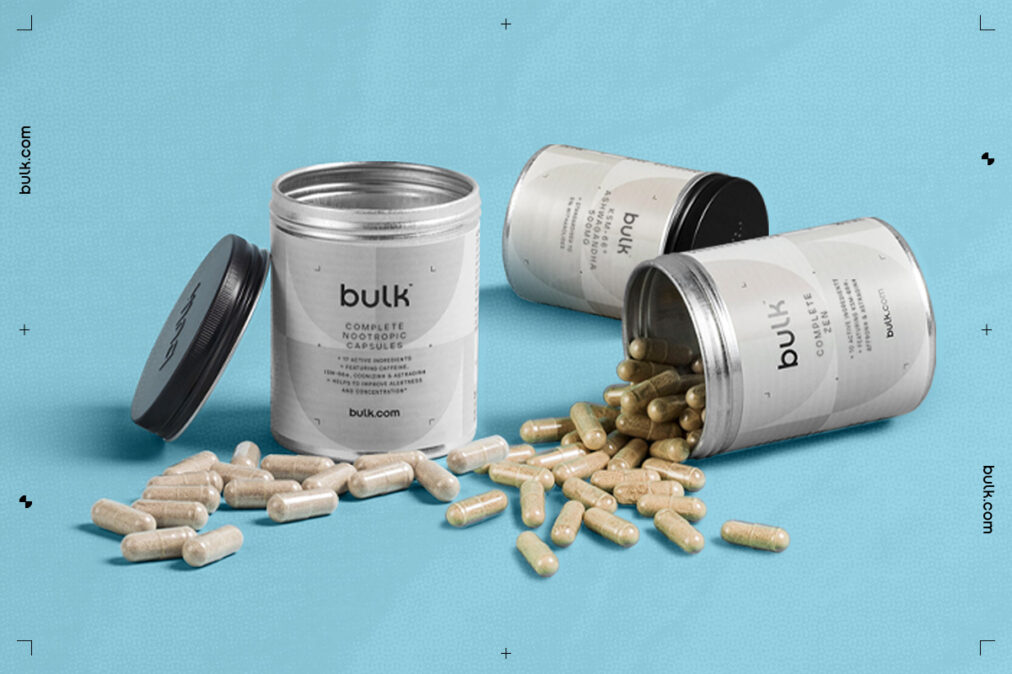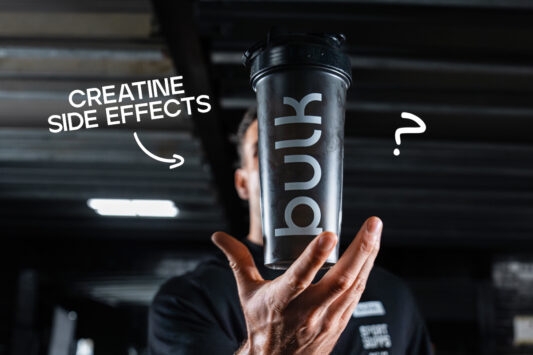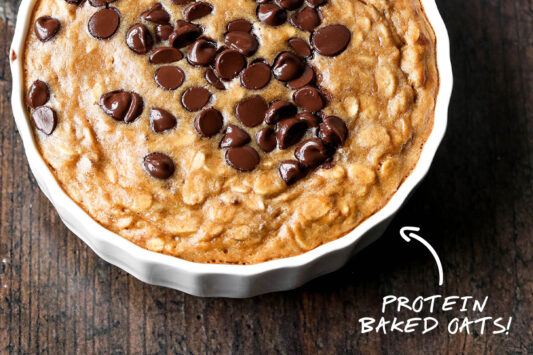Nootropic supplements have been around to some degree for a very long time, known to a relatively select few. Interest really stepped up a gear when the film Limitless launched in cinemas and brought the idea to the masses.
Suddenly, everyone seemed to be searching for a smart drug that would enable them to function at a higher level. As of now, the global nootropic market is valued at a staggering £10 billion.
Here we explore what nootropics are and how they work, with examples of some specific types of nootropics and what they do.
What is a nootropic?
The term ‘nootropic’ is derived from the ancient Greek words νόος (nóos) meaning “mind” and τροπή (tropḗ) meaning “a turning“. Put simply, a nootropic is a supplement that can elicit a change in mental state. This can be anything from focus, to relaxation, to learning, to concentration.
What are nootropics made of?
Unlike their prescription counterparts, nootropics tend to be made of natural substances. Nootropics can be grouped into stimulants, amino acids, adaptogens and botanical ingredients. These can be anything from mushrooms to herbal roots.
What are nootropics good for?
Nootropics are used for changing mental states to improve human thinking, learning and memory. Loosely, nootropics are taken for focus, relaxation, learning, stress and looking after the brain as a whole. They are used by shift workers, bodybuilders, students and gamers.
Let’s get into these benefits in more detail.
Nootropics for alertness, focus and concentration
Adderall and Modafinil
Adderall and Modafinil are two examples of common prescription drugs that are frequently abused (for want of a better expression) by healthy individuals to elicit states of extreme focus.
Adderall is used to treat ADHD, while Modafinil is prescribed for narcolepsy. Bulk™ do not sell these drugs (we see you searching for them on our site), nor will we, therefore they won’t be discussed in too much detail here. There are also a bunch of non-compliant substances out there, such as racetams, Noopept and Huperzine A, which also won’t be discussed.
Caffeine & Cholinergics
Anyone who’s unapproachable before their first coffee of the day will be very familiar with the effects of caffeine. But they may be less aware of choline and cholinergic substances. Both are important.
One of our key neurotransmitters is called Acetylcholine (ACh). It’s primarily used to send chemical messages throughout the nervous system – essentially what tells your body to ‘do stuff’.
Cholinergic supplements, including Cognizin® and DMAE, are taken with the intention of increasing the availability of Choline. This is one of the components of ACh. Higher levels of the components of ACh helps to make sure that this isn’t a rate-limiting factor in its production.
When we wake up, our levels of ACh are as high as they’re going to be for the day. As the day wears on, ACh is broken down by Acetylcholinesterase, whilst another neurotransmitter called Adenosine builds and binds to receptors in the brain. This eventually makes us sleepy.
Fans of creatine supplementation might recognise Adenosine from Adenosine Triphosphate (ATP). Caffeine directly competes with Adenosine for these receptor sites. This means less is able to bind, prompting the release of more Acetylcholine and making us feel more awake.
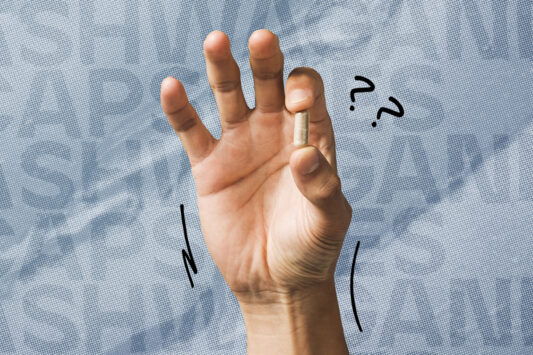
Nootropics for relaxation
Magnesium
Fans of Andrew Huberman will have heard him talk at length about the alleged benefits of Magnesium Threonate. A highly-bioavailable (easily absorbed and assimilated) form of supplemental magnesium.
There’s one problem with recommending this, as Magnesium Threonate is non-compliant in the UK and EU. We would therefore recommend checking out Magnesium Bisglycinate.
Magnesium carries several approved health claims, the most relevant of which is “Magnesium contributes to normal psychological function”. The effect of magnesium on sleep is also a growing area of interest. With a systematic review of research reporting an association between magnesium status and sleep quality [1].
Phosphatidylserine
Cortisol is one of the body’s “stress-response hormones”. It’s released in stressful situations and has some essential roles to play in keeping us alive (such as adrenaline).
A spike in this hormone is quite common when facing a fight or flight response, as well as a large dose of caffeine. Long-term elevated levels of cortisol is associated with anxiety disorder and chronic stress. Neither of which are conducive to sleep and relaxation.
Phosphatidylserine (or PS) is a phospholipid naturally found in the brain which plays a role in cell signalling. It’s and can be an effective mood enhancing substance as it tends to normalise high cortisol levels. It’s for this reason that you’ll quite often find PS in relaxation formulas.
Saffron
Common in paella, less common in stress-relief formulas. The typical dose of supplemental Saffron is 30mg, which might seem tiny compared to other nootropics. But Saffron is more expensive than gold on a weight-by-weight basis, so your wallet will thank you for not taking more than the recommended dose.
Other nootropics used for relaxation are L-Theanine, Ashwagandha, 5-HTP, Panax Ginseng and Lemon Balm.
Nootropics for learning
Through the magic of on-hold health claims and research, we’re going to attempt to discuss this section in a compliant manner.
Bacopa monnieri
Bacopa monnieri is one of the best-known botanical nootropics. It currently holds the on-hold claim that it may help to improve concentration and memory. This sounds pretty powerful, so let’s dig into it.
Bacopa has lots of research behind it, with support for a positive effect with longer-term (normally 1-3 months).
One study observed the effect of a bacopa supplement on working memory, reasoning, reaction time and attention. All features of overall cognitive function. The subjects in this study were young and healthy, making it particularly interesting. Especially as the results showed a significant effect on attention, working memory and recall [4].
Ginkgo biloba
Ginkgo is one of the oldest nootropic supplements out there, rooted in traditional Chinese medicine. Leaves from the Ginkgo biloba tree are ground into powder and taken supplementally and it’s proved to be a popular, cost-effective nootropic.
Ashwagandha
“Why, why have you not yet discussed Ashwagandha?” we hear you ask. Well, here you go.
Adaptogens are botanical ingredients that are thought to help the body cope with stress and modify the stress response. Think of them as little plant-based shields against what life can sometimes throw at you.
Ashwagandha has been one of the major supplemental success stories of TikTok. Content creators have been pushing it for a number of reasons, some stronger than others. For example, for stress relief (supporting evidence is pretty robust) to testosterone support (much less robust).
Ashwagandha, or Withania somnifera holds a number of on-hold health claims. These include:
- “Withania somnifera helps to support relaxation, mental and physical wellbeing”
- “Withania somnifera helps to maintain physical and mental capacities in cases of weakness, exhaustion, tiredness and loss of concentration”
All in all, several good-sounding reasons to give it a try.
Benefits of ashwagandha
Following supplementation for 8 weeks, one study showed a beneficial effect on serum cortisol levels, perceived stress levels and sleep quality [5].
There are still questions as to the mechanism of action behind the many touted benefits of ashwagandha. As with most botanical supplements, this root would benefit from more research, especially into optimal doses.
Other popular adaptogens include Rhodiola rosea and Panax Ginseng. Out of the categories above, Cordyceps and Lion’s Mane mushrooms also fit this category the best. Talking about mushrooms in a compliant manner is unfortunately difficult and there are also many popular mushroom varieties out there.
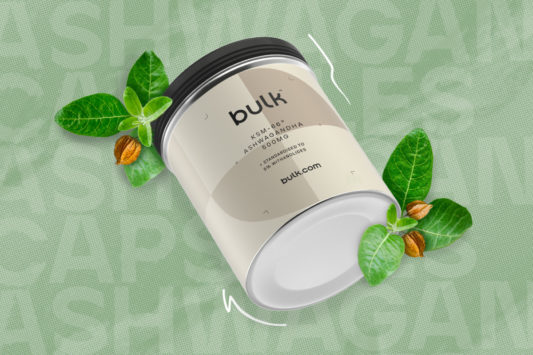
What are the side effects of nootropics?
As with every supplement, the devil is in the dose. Too much caffeine can cause feelings of anxiety and uncertainty. Recently, higher than recommended doses have been linked to GI distress.
So be careful. Everything has a recommended daily limit for a reason. and we highly advise you to stick to researched and recommended doses.
What are Bulk’s nootropics?
We have five nootropic formulas, each of which has a different purpose.
Complete Nootropic™ is our all-singing, all-dancing, ‘get stuff done’ formula. We would recommend this to be taken occasionally, when you really need to feel its impact.
As the name suggests, Daily Nootropic is designed to be taken on a daily basis. This is a selection of non-stim adaptogens and botanical ingredients, designed to help to improve concentration and memory.
Complete Zen™ is a hero-tier power-down formula. This combines magnesium, ashwagandha and saffron with seven other ingredients to help whenever a period of calm is required.
Kickstart Nootropic is designed to kickstart your day with 10 targeted ingredients to hit energy, alertness and blood circulation. It helps to maintain the elasticity of blood vessels, contributing to normal blood flow. Kickstart can be taken instead of your morning coffee.
Brain Health Capsules contain Bacopa, Ginkgo and Choline. They also have antioxidants, vitamins and minerals that contribute to normal mental performance.
Related articles
Eager to learn more vitamins? We believe that every person, with support, has the right to transform their lives through fitness. That’s why we’ve put together hundreds of articles with expert advice, all to help you on your fitness journey. With ultimate guides, information and benefits, check out our vitamin-related articles below:
What is Ashwagandha? Different types of Protein Snacks
How to Boost your Immune System Health Heroes: 4 Great Products
Benefits of Mushroom Supplements Protein Chocolate vs Regular Chocolate
Best Supplements for Students Benefits of a Complete Food Shake
Introducing Essential Whey Protein What is the 1™ Complete Food Shake?
It’s worth mentioning that a lot of the research on nootropics is conducted on branded ingredients. These trials are often funded by the companies that own the patent on the ingredient, raising the possibility of publication bias. By no means does this mean the findings are invalid, but it’s worth considering when coming to your own conclusions.
